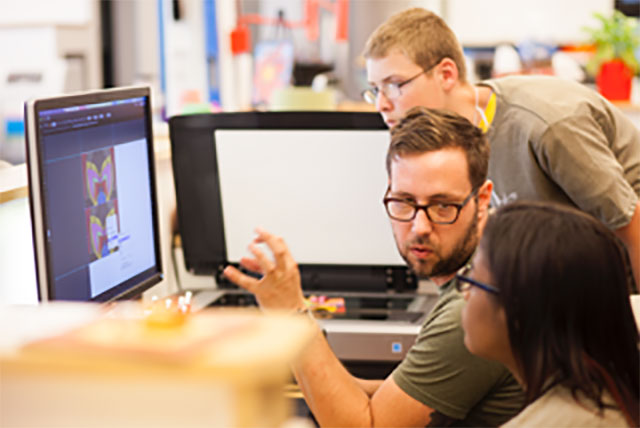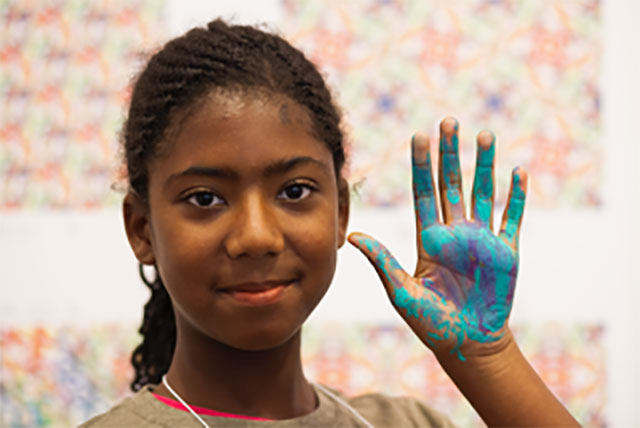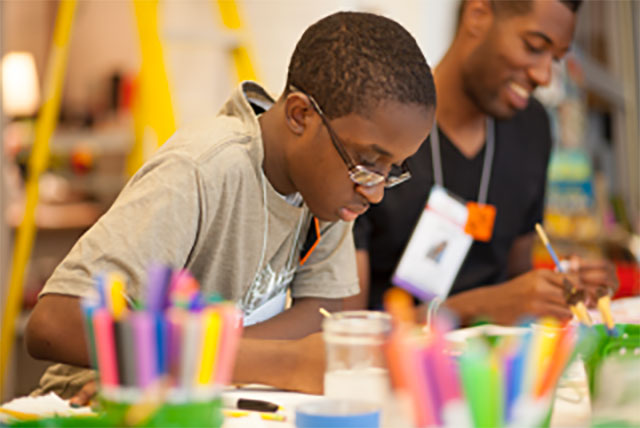
Cool Jobs helps kids find creative careers to love for life

Photo: Fresh Artist’s Design Camp pairs Fresh Artist kids with professional designers around developing repeat patterns and product development. Co-founder Roger Allen works on a project with students. Credit: Brian Lauer
Board member Jason Janes of Untuck works with young Alpha B. On a project.
A stereotype spawned Barbara Chandler Allen’s first brilliant idea to convince creative kids that art could be their future.Related Link
“When I was a stay-at-home mom a million and a half years ago, someone told me: ‘Oh, your boys are so creative, but artists starve! They better find a career where they can be more successful!’” said Allen, who turned that stereotype on its head by organizing an “Artists at Work” showcase at her sons’ elementary school of successful career artists.
Another stereotype – this one backed by a sad statistic – drove Allen to decide that her program was overdue for expanding to older students.
“We’ve been told that more than half of the children in our inner-city schools drop out after eighth grade,” Allen said. “We saw something that was wrong, but we also saw a way to fix it.”
The result is Cool Jobs, a three-day pop-up expo for at-risk kids planned for Feb. 23-25 at Moulin at Sherman Mills in Philadelphia’s East Falls neighborhood. Close to 600 seventh-graders will visit with working artists – chefs, architects, video-game designers, photographers, furniture makers and more – who will talk about their paths to professional creativity. Students also will go home with backpacks full of information on programs for creatives at local high schools and colleges.
The program, which is funded by Knight Foundation, is a new initiative of Allen’s Fresh Artists, a nonprofit that provides reproductions of student artwork to businesses as a way to raise money for school art supplies. Allen, who herself made a creative career as a private art consultant and museum collection manager, aims to eventually expand Cool Jobs to other cities.
“For children living in abject poverty, purpose is elusive. They don’t see beyond the weekend,” Allen said. “We want the kids to fall in love with a dream and end up with a job to love for life. What we’re trying to do is revolutionary: We’re throwing them a lifeline to jobs they never knew existed. We’re passing them keys to creativity that can change the trajectory of a life. It’s cracking open doors to a secret garden of creative people.”

Credit: Brian Lauer
The first step is showing students all the unexpected ways they can become career artists.
“There’s never been a time in the history of the world where there were more opportunities for a creative person to make a living being creative,” Allen said. “The chairs you’re sitting on, the pretty shoes you’re wearing, the wallpaper, the lighting, the Crate & Barrel pottery on your stove, the car in your driveway, your cell phone, the packaging of the cereal you eat for breakfast – all of these were created by artists and designers.”
The expo will be set up like a trade show, with students breaking into small groups to visit artists at booths where they will talk about where they grew up and went to school, who influenced them on their path to professional creativity and how they do what they do. They’ll demonstrate the tools of their trade and answer students’ questions.
Some of the presenters, like graphic designer Jason James, seemed destined to become career artists – even though their path to professional success might not have been direct.
“As a kid growing up in Philly, I always had a love of superheroes and comic books,” James said. “I was about 4 when I drew a leopard, and my father asked me if I had traced it. I said no. From that point on, he pushed me and encouraged my love of art.”

James went to Messiah College in Mechanicsburg, Pa., where he first majored in communications and film.
“I didn’t know you could make a career out of drawing,” he said.
A friend studying graphic design persuaded James to switch majors, and he hasn’t looked back.
Another Cool Jobs presenter, muralist David Guinn, grew up poor in Philadelphia, where he indulged his passion for painting and drawing by turning T-shirts and shoes into works of art. Back then, he couldn’t imagine a creative future. He studied architecture at Columbia University in New York, mostly because he wanted to live in New York and saw architecture as “more firmly grounded as a traditional job.”
But it didn’t make him happy. After graduating, he dreamed of working with his hands and making things “that had a direct impact.” He tried out all sorts of careers, working as an architect’s assistant, a Photoshop technician, a construction laborer and a bike messenger.
“One day, while delivering packages, I watched people painting a big billboard and thought: ‘That looks like something I would really like to do.’ But I didn’t know how to get into the field,” Guinn said.
After moving home to Philadelphia, he met a mural painter, and something clicked. He got a job working for an interior mural painting business, and a subsequent job with the renowned Philadelphia Mural Arts Program. Now, he is an independent muralist who has painted more than 35 murals since 1998 in cities including Philadelphia, New York, Washington, D.C., Chicago, Montreal, Quebec and Amman, Jordan.
And Gerald Drummond, a Cool Jobs mentor and executive chef for Starr Catering, grew up in a financially-struggling, single-parent home in South Philadelphia.
“I know what it’s like to not have food. I know what it’s like to struggle. I know what it’s like to be changing schools all the time,” Drummond said.
His first restaurant job was washing dishes. That turned into a cooking job, where his talents shone so much that someone suggested he go to culinary school.
Instead, he worked four days for pay at a mom-and-pop restaurant on the Hudson River, and spent his off days working for free in restaurants in New York City, just to build his culinary skills.
Since then, he has cooked in kitchens from Miami to Chicago to London and Mexico.
He attributes his success to hard work, as well as wisdom rooted in his underprivileged childhood.
“We had a saying in my household. It was like the commandments: We were poor, but we were going to be educated, we were going to speak properly, we would be presentable, and – this is the most important part – we were not going to be angry,” Drummond said. “And that’s been my philosophy ever since. When people hear ‘disadvantaged,’ ‘poor’ or ‘underprivileged,’ they think ‘problem.’ They think ‘undependable,’ ‘inconsistent,’ ‘lazy.’ You have to work harder at being the best. But you can be the best.”
Dana DiFilippo is a Philadelphia writer. Follow her via @danadifilippo on Twitter.
Recent Content
-
Artsarticle ·
-
Artsarticle ·
-
Artsarticle ·

